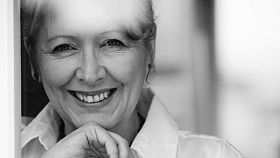


Helena Třeštiková: My Top 10

More documentary film history… chapeau for DOKLeipzig and IDFA that both festivals (more than before?) look back and not “only” take the temperature of what’s new in the documentary world. Here some words on the selection done by Czech documentary superstar (she will hate that I call her so!) Helena Třeštiková, who has been asked by IDFA to make her Top 10. The link below brings you to her article about the choice, she made, personal and with this wonderful quote by Věra Chytilová, whose film from 1963 “Something Different” is on the list: ““A film should have truth, aesthetics, intellect, feeling and a belief, because film should be true, exciting, necessary, beautiful and full of hope”.
Of course there must be a film by Milos Forman, “The Firemen’s Ball” (1967), and I loved her choice of Georges Rouquier, “Farrebique – The Four Seasons” from 1946, farmers in France; we had this gem in the catalogue of Statens Filmcentral (National Film Board of Denmark), no objection either to have “The Seine Meets Paris” (1957) by Ivens and Jacques Prévert, and Třeštiková reminds us about Havel, when she writes about “Citizen Havel”:
In 1992, I was present for the historic meeting where director Pavel Koutecký told then-president Václav Havel that he would like to follow him with a camera for 10 years. Havel agreed, thus clearing the way for one of the most noteworthy long-term film projects whose protagonist was a politician in office. Havel was extraordinary in many ways: originally a dramatist, then a dissident, prisoner, and after the revolution a president. He allows himself to be filmed in situations where other politicians would immediately shoo a filmmaker off. But he gives Koutecký and his crew his full trust. Part of the agreement was that the film would only be released five years after the president’s term in office. But the director tragically died just as the film was in its final stage, and it was completed by his colleague, Miroslav Janek, in 2007. I think that no one will ever make such an open film about a politician and his times again…
I think I have seen that film 10 times at least.
Having met Helena Třeštiková several times, including fine talks at the Magnificent7 festival in Belgrade, I know how much, she cares about the protagonists, she has been filming over many years. The ethical question is raised by her in connection with her taking “First Love” (1974) by Kieślowski on her list. The Polish master follows over a year a young couple expecting a child but refrains from continuing afraid of how the filming would influence the lives of the couple. Whereas Třeštiková continued following a family for 37 years in the film that became the masterpiece “Private Universe”. OBS: If you are not going to IDFA, the films of Helena Třeštiková can be found on
https://dafilms.com/director/167-helena-trestikova
She ends up with a very well deserved tribute to Slovak Peter Kerekes and his “66 Seasons” (2003), I agree when she writes “I consider this a beautiful example of inventiveness in filmmaking, imaginativeness in direction and walking a tight rope in editing. For me, it is something of a textbook for the opportunities of using film language in a documentary.”